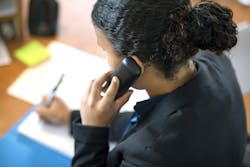Friendliness is important when answering phones
Dear Dianne,
I’ve recently received several complaints from patients and specialists regarding telephone calls to our office. Some calls go straight to voice mail if all of the lines are busy, but we do make every effort to return those calls promptly. Truthfully, I’m so busy with my work that I don’t even know how the business assistants are answering the phone. Would you be willing to share some phone tips? We obviously need to ramp up our phone skills.
Dr. Frank
Dear Dr. Frank,
The telephone is your lifeline to the buying public. If it is not being answered promptly and properly, you are losing business.
First, if yours is a solo practice, calls should be answered (preferably on the first ring) by a live person. Rolling to voice mail should be the exception, yet I’ve witnessed assistants allowing calls to roll over simply because that was easier than answering. You need to make sure you are properly staffed at your business desk. Instill the idea that a ringing telephone is a blessing, not an inconvenience.
Phone greetings fall under three categories: adequate but substandard, average, and outstanding. My experience is that most practice owners aspire to offer outstanding service, including how their patients are greeted. Here are examples:
Adequate: Good morning, Premier Dental.
Average: Good morning, Premier Dental. This is Paula.
Outstanding: Thank you for choosing Premier Dental. This is Paula. With whom am I speaking? Hello, Stephanie. How may I assist you today?
The third greeting is outstanding for several reasons. First, it eliminates the often confusing “Good morning” or “Good afternoon” dilemma where harried business assistants say “Good morning” after noon. Second, the caller is thanked for choosing the practice. You do have competition, right? Third, the person answering identifies herself and then asks for the identity of the caller. This allows the person answering to use the caller’s name right away, which forms a connection. (I ask business assistants to jot down a person’s name so that they don’t have to ask for the caller’s name again.) Finally, “How may I assist you” sounds polished and professional, promoting the image you wish to project.
Of course, no greeting works well when the person answering sounds flat, rushed, or unhappy. If the answerer puts a smile on her face, that same smile will show up in her voice. A happy voice is critical in an outstanding greeting.
In my opinion, friendliness at the business desk is not an option; it is mandatory! Patients form perceptions of a dental practice starting with their first interaction with the business assistants. Negative interactions before patients even meet the doctor can increase their dread and lead to broken or canceled appointments.
If the business assistant needs to put a caller on hold, he or she should ask, “May I put you on hold momentarily, or should I call you back?”
Another tip is that the business assistant should never ask, “Are you a patient here?” A long-standing patient could be offended by this question. Rather, if the assistant needs to ascertain whether the caller is a patient of record, he or she should ask, “Tell me, when was the last time you visited us?” This question allows the assistant to determine if the caller is a patient of record or a new patient without offending the caller.
I hope you will share these tips with your group during a staff meeting. Your business assistants may need to post the new greeting where it can be seen until they learn it. Implementing better verbiage with patients is a step in the right direction toward better communication.
All the best,
Dianne
Dianne Glasscoe Watterson, MBA, RDH, is a consultant, speaker, and author. She helps good practices become better through practical analysis and teleconsulting. Visit her website at wattersonspeaks.com. For consulting or speaking inquiries, contact Watterson at [email protected] or call (336) 472-3515.
About the Author

Dianne Glasscoe Watterson, MBA
Speaker, author, and consultant
Dianne Glasscoe Watterson, MBA, is a consultant, speaker, and author. She helps good practices become better through practical on-site consulting. Visit Dianne's website at wattersonspeaks.com. For consulting or speaking inquiries, contact Dianne at [email protected] or call her at (336) 472-3515.
Updated April 29, 2016
